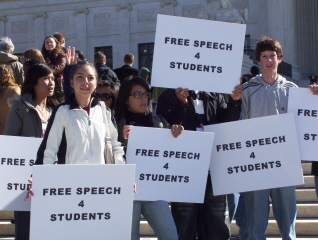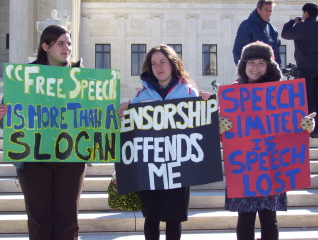The US Supreme Court moved Monday to tighten limits on free speech for high school students, ruling that an Alaska high school could constitutionally punish a student who held up a 14-foot-long banner reading "Bong Hits 4 Jesus" during a school-related event. In a 5-4 decision, the high court held that schools may prohibit students from expressing views that could be interpreted as advocating drug use.

The ruling came in Morse v. Frederick, a case that began in 2002 when Joseph Frederick led a group of students holding the banner aloft as an Olympic parade passed by. Students had been excused from school to attend the event. Principal Deborah Morse interpreted the nonsensical banner as a "pro-drug message," tore down the banner, and punished Frederick with a 10-day-suspension from school. Frederick filed suit in federal court charging that Morse and the school district had violated his First Amendment free speech rights, and after a series of rulings taking the case back and forth, it eventually ended up at the Supreme Court.
"The message on Frederick's banner is cryptic," Chief Justice John Roberts said in the majority opinion. "But Principal Morse thought the banner would be interpreted by those viewing it as promoting illegal drug use, and that interpretation is plainly a reasonable one."
A number of drug reform and civil liberties organizations, including the Drug Policy Alliance and Students for Sensible Drug Policy, as well as a broad spectrum of groups including the conservative American Center for Law and Justice, Christian Legal Society and Rutherford Institute to the Student Press Law Center, Lambda Legal Defense and Education Fund, and the National Coalition Against Censorship filed or joined briefs supporting Frederick. The ACLU argued Frederick's case before the court.
While the narrowly drawn decision limits student speech regarding illegal activities, it does not give school administrators the right to suppress speech advocating political positions, such as the legalization of drugs. As Chief Justice John Roberts noted in the majority opinion, "This is plainly not a case about political debate over the criminalization of drug use or possession."

"The decision indeed cuts back on speech rights for high school students," said UCLA law professor Eugene Volokh, author of the Volokh Conspiracy law blog. "It claims on the one hand that 'Bong Hits 4 Jesus' is an endorsement of illegal drug use, but at the same time, it denies that those words carry any kind of political or social message, and of course they do. Either it was nonsense, in which case it wasn't advocating anything, or, if it was advocacy for illegal drug use, it carried a social and political message."
The ruling could lead to move attempts to restrict student speech, Volokh said. "As a result of this confusion, lower courts may find more student speech to be unprotected because of unsound judgments that it is not really political advocacy."
There is also the sticky question of what happens when students combine advocacy of illegal drug use and advocacy of a political position, Volokh said. "What if someone says 'Repeal the marijuana laws because it's fun and safe'? That's a tougher question."
Reaction to the verdict from Frederick supporters was a mixture of disappointment, concern, and relief. "We take mild comfort that the decision clearly protects speech challenging the war on drugs. Never before has the Supreme Court stated so clearly that speech attacking the wisdom of the war on drugs is protected wherever it may occur," said Daniel Abrahamson, director of legal affairs for the Drug Policy Alliance.
"But who is going to decide what is appropriate speech?" Abrahamson continued. "Students are on the front lines of the war on drugs, and we are deeply concerned that free speech will now be administered by those who may wish to suppress open discussion on a range of topics such as the effectiveness of the DARE program, school drug testing policies, or random locker searches. Our constitutionally protected rights to free speech shouldn't have an arbitrary drug war exception."
"Thankfully the Supreme Court agreed with the arguments SSDP set forth in our brief, limiting punishable speech to that which expressly promotes drug use," said SSDP executive director Kris Krane. "But we are concerned that the Supreme Court's decision could cause confusion among school administrators, who may overreach and punish students for speech about drug policy despite the court's ruling today."
"We are disappointed by the Supreme Court's ruling, which allows the censorship of student speech without any evidence that school activities were disrupted," said Douglas K. Mertz, an ACLU cooperating attorney who argued the case before the Supreme Court.
"The Court's ruling imposes new restrictions on student speech rights and creates a drug exception to the First Amendment," said Steven R. Shapiro, ACLU National Legal Director. "The decision purports to be narrow, and the Court rejected the most sweeping arguments for school censorship. But because the decision is based on the Court's view about the value of speech concerning drugs, it is difficult to know what its impact will be in other cases involving unpopular speech.
"The Court cannot have it both ways," Shapiro added. "Either this speech had nothing to do with drugs, which is what Joe Frederick claimed all along, or it was suppressed because school officials disagreed with the viewpoint it expressed on an issue that is very much the subject of debate in Alaska and around the country."
If the ruling is a disappointment and a concern for free speech advocates, it is also notable for one of the most striking critiques of marijuana prohibition ever heard from the high court. In his dissent, Justice John Paul Stevens, joined by Justices David Souder and Ruth Bader Ginsburg, compared the current prohibition of marijuana to alcohol Prohibition. "But just as prohibition in the 1920's and early 1930's was secretly questioned by thousands of otherwise law-abiding patrons of bootleggers and speakeasies," wrote Stevens, "today the actions of literally millions of otherwise law-abiding users of marijuana, and of the majority of voters in each of the several States that tolerate medicinal uses of the product, lead me to wonder whether the fear of disapproval by those in the majority is silencing opponents of the war on drugs. Surely our national experience with alcohol should make us wary of dampening speech suggesting -- however inarticulately -- that it would be better to tax and regulate marijuana than to persevere in a futile effort to ban its use entirely."
"Even in high school," Stevens continued, "a rule that permits only one point of view to be expressed is less likely to produce correct answers than the open discussion of countervailing views⦠In the national debate about a serious issue, it is the expression of the minority's viewpoint that most demands the protection of the First Amendment. Whatever the better policy may be, a full and frank discussion of the costs and benefits of the attempt to prohibit the use of marijuana is far wiser than suppression of speech because it is unpopular."
That's the minority viewpoint, of course. But when talk like that starts coming from a Supreme Court justice, it makes one wonder just how hollow the drug prohibition edifice is. Steven's dissent suggests there is serious rot in the drug war consensus.
This work by StoptheDrugWar.org is licensed under Creative Commons Attribution-ShareAlike 4.0 International
Comments
Why is America breaking its own law?!
This is all a bunch of crap. The First Amendment clearly states, and I quote, "Congress shall make no law respecting an establishment of religion, or prohibiting the free exercise thereof; or abridging the freedom of speech, or of the press; or the right of the people peaceably to assemble, and to petition the Government for a redress of grievances." It said NOTHING about it not applying to students to a schoolhouse. What about promoting prostitution? It's illegal to promote prositution. Is promoting prostitution not the freedom of speech? It is. But the government makes /many/ laws "abridging the freedom of speech." I think that students in a schoolhouse should have the same rights as every other US citizen, because the Constitution gave those rights to EVERY citizen. That law is blatantly unconstitutional.
In reply to Why is America breaking its own law?! by Anonymous (not verified)
No
The Court ruled in Bethel v Fraser (an earlier case regarding student speech) that the rights to freedom of expression of students are not "automatically coextensive" with the rights of adults, because the right to freedom of expression in a school setting must be balanced with the need for a school to maintain itself as a moral and ethical example to students.
In the landmark Brandenburg v Ohio case, the Supreme Court ruled that the Ku Klux Klan could advocate violence against the government as a form of free speech as long as it did not explicitly instruct its members to do so, thus creating a standard that any individual or institution in the public forum can say pretty much anything as long as it does not incite or probably incite imminent violence of harm.
The same standard cannot be used in a school. It would not be appropriate, for example, for a group of students to stand outside the principal's office while screaming that the principal deserves to die for giving bad grades.
For the same reason, since it is in the school and the students' interest that the school maintain a drug-free atmosphere, it is perfectly reasonable that the principal, who was protected by qualified immunity, took down the poster fearing that the student's message would soil the school's image as a drug-free place.
Supreme Jesters Side with the Supremely Ignorant... Surprise!
I'm confused... when high schoolers understand the constitution better then the majority of the highest court in the land... is that a good or bad thing?
Me, I just added those 5 Jesters to my mile long mental list of Constitutional Criminals that belong in prison... certainly not positions of judicial eminence!
The Constitution is not just a good idea.... IT IS THE LAW!
And 5 out of 9 Jesters blatantly broke that law & that will never be forgotten... thanks to history!
As long as rational people continue to tolerate the irrational beliefs & failed theories the Ridiculous Religious Right & Lunatic Sociaist Left keep regurgitating we will continue to lose ground to these jackass criminal jokers.
As long as irrational people continue there love affair & addiction to the 2 most dangerous man made social narcotics known to man... Government & Religion... we will continue to suffer under insidious & unlawful dictates!
Shit, whats a poor rational secular boy with ample common sense to do when surrounded by such long lived ignorance & irrationality?
Smoking On It,
Billy B. Blunt
Bongs for Cigs, Beer and Whiskey. Yea Jesus, the blood of wine.
Canât promote âillegal drugâ use? Then its time to unfurl banners that mock the principal and the ruling: Bongs for Tobacco Filters, Bongs for Truth, Bongs for Principals, Bong the Principal Supporters of the Drug War. Beer for Jesus! Three martinis for Jesus! Whiskey and Robes = Black Velvet Ruling for legal drug use.
Bongs for Jesus should become a national rally cry for hempsters and anti -drugwar warriors; a Cindy Sheehan movement against the Drug War. Bongs not Bombs! Bong the Iraqis! Bong Iran! Bong Bush the AntiChrist! Bong, Bong and Bong Bong.
Now, A Bong for Me!
Up in Smoke
IM
Belteshazzar
Add new comment